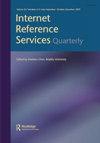Assessment of Medical Students’ Knowledge and Access to Scientific Journal Articles in Jordan: Insufficient Knowledge Has Potentially Negative Effects on the Social Response to COVID-19
Q3 Social Sciences
引用次数: 3
Abstract
Abstract This study aims to evaluate medical students’ impressions and attitudes toward scientific journal articles, and their accessibility to them in one of the developing countries, Jordan. Fourteen questions were asked to medical students to assess their knowledge and accessibility to papers, and to discover the impact of low interest in scientific papers on students’ dealing with COVID-19. Data were analyzed using descriptive and analytical statistics. The study found that there is an unsatisfactory reading for scientific journal articles among medical students, with only 47.2% of students reading them. Furthermore, there are unsatisfactory results regarding students’ knowledge about journal types from the trust perspective (i.e., predatory and reliable journals). This was mainly because of a lack of adequate universal teaching about scientific journal articles, as 86.7% of medical students reported that their universities do not teach them about scientific journal articles. The absence of comprehensive learning about scientific journal articles had a potential negative impact on the medical student’s handling of COVID-19 socially (i.e., advising people in the community about vaccination importance, social distancing, and other preventive measures). Librarians should be involved primarily in undergraduate education related to scientific journal articles, and their role in providing subscription-based journals free of charge, as well as protecting students from predatory journals through suitable library instructions, is essential.约旦医学生的知识评估和科学期刊文章的获取:知识不足对新冠肺炎的社会反应具有潜在的负面影响
摘要本研究旨在评估发展中国家约旦医学生对科学期刊文章的印象和态度,以及他们对这些文章的可及性。向医学生提出了14个问题,以评估他们的知识和论文的可及性,并发现对科学论文兴趣低对学生应对新冠肺炎的影响。使用描述性和分析性统计学对数据进行分析。研究发现,医学生对科学期刊文章的阅读并不令人满意,只有47.2%的学生阅读了这些文章。此外,从信任的角度来看,学生对期刊类型(即掠夺性和可靠的期刊)的了解也存在不令人满意的结果。这主要是因为缺乏足够的科学期刊文章的普遍教学,因为86.7%的医学生报告说,他们的大学没有教他们科学期刊文章。缺乏对科学期刊文章的全面了解,对医学生在社会上处理新冠肺炎(即,向社区中的人们建议疫苗接种的重要性、保持社交距离和其他预防措施)产生了潜在的负面影响。图书馆员应主要参与与科学期刊文章相关的本科教育,他们在免费提供订阅期刊以及通过适当的图书馆指导保护学生免受掠夺性期刊的侵害方面的作用至关重要。
本文章由计算机程序翻译,如有差异,请以英文原文为准。
求助全文
约1分钟内获得全文
求助全文
来源期刊

Internet Reference Services Quarterly
Social Sciences-Library and Information Sciences
CiteScore
2.40
自引率
0.00%
发文量
13
期刊介绍:
Internet Reference Services Quarterly tackles the tough job of keeping librarians up to date with the latest developments in Internet referencing and librarianship. This peer-reviewed quarterly journal is designed to function as a comprehensive information source librarians can turn to and count on for keeping up-to-date on emerging technological innovations, while emphasizing theoretical, research, and practical applications of Internet-related information services, sources, and resources. Librarians from any size or type of library in any discipline get the knowledge needed on how to best improve service through one of the most powerful reference tools available on the Internet.
 求助内容:
求助内容: 应助结果提醒方式:
应助结果提醒方式:


